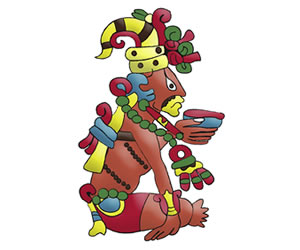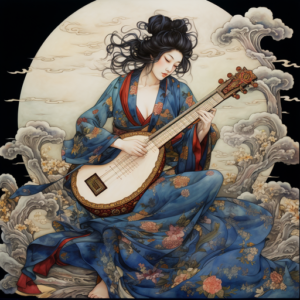Benzaiten, also known as Benten or Benzaitennyo, is a prominent deity in Japanese mythology and a central figure in both Buddhism and Shintoism. Derived from the Indian goddess Saraswati, Benzaiten’s origins can be traced back to Hindu mythology. Over time, her character and attributes merged with local beliefs, giving rise to her unique form in Japanese culture.
In Japanese mythology, Benzaiten is often associated with the goddesses of fortune known as the Seven Lucky Gods. She is considered one of their prominent members and is sometimes depicted alongside the other deities of good fortune and prosperity. While her direct family connections may vary in different traditions, Benzaiten is often regarded as a sister or consort of the sea god, and she is sometimes portrayed with a serpent, symbolic of her connection to water.
Appearance
Benzaiten is typically depicted as a graceful and elegant goddess. She is often portrayed as a beautiful young woman adorned in flowing robes, symbolizing her association with water. Her hair is cascading and sometimes crowned with a golden headdress or a jeweled tiara. Benzaiten’s serene countenance reflects her role as the goddess of knowledge, arts, and beauty.
Powers & Abilities
Benzaiten is believed to possess a diverse range of powers and abilities. She is revered as the goddess of music, eloquence, learning, and the arts. Benzaiten’s influence extends to all forms of creativity, including poetry, painting, calligraphy, and performance arts. She is also associated with water, possessing the power to control and channel its flow, which is symbolic of the fluidity of artistic expression.
Worship
Benzaiten is widely revered and worshipped in Japan. Numerous shrines dedicated to her can be found throughout the country, particularly near bodies of water. Worshipers pay homage to Benzaiten by offering prayers, musical performances, and artistic expressions in her honor. Rituals involving water, such as purification ceremonies or releasing floating lanterns, are also common in her worship.
symbols
Benzaiten is associated with several symbols that represent her domains and attributes. The biwa, a traditional Japanese lute-like instrument, is considered her sacred instrument and is often depicted alongside her. The dragon, specifically the sea dragon, is a symbol frequently associated with Benzaiten, highlighting her connection to water and her role as a protective deity. Other symbols linked to her include lotus flowers, peacocks, and sacred mirrors.
Facts about benzaiten
- Benzaiten is one of the only female members among the Seven Lucky Gods, which primarily consist of male deities.
- Her association with water also extends to matters of love and relationships, and she is often invoked for blessings in matters of romance and marriage.
- Benzaiten’s worship became particularly popular during the Edo period, where she was revered as a patroness of the geisha, who excelled in the arts and entertainment.
- The Enoshima Island in Kanagawa Prefecture is a renowned pilgrimage site dedicated to Benzaiten, attracting visitors seeking blessings in education, arts, and love.
- Benzaiten’s influence extends beyond Japan, with her worship and presence also found in other East Asian countries like Korea and China, where she is known as the goddess of music and literature.
*As an Amazon Associate I earn from qualifying purchases.






